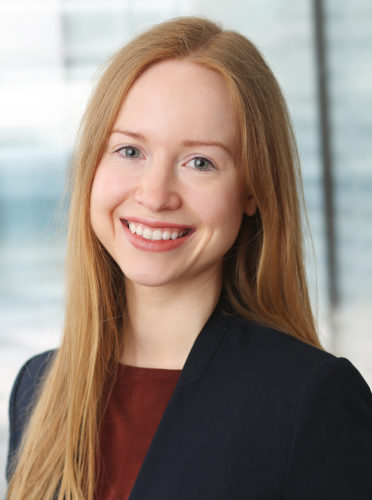Substitute professorship in Knowledge Engineering in the winter semester 2025/26
Dr Katrin Hartwig will take over as substitute professor of Knowledge Engineering from 1 October for the 2025/26 winter semester. She is currently a research assistant and postdoctoral fellow in the Research Group ‘Science and Technology for Peace and Security’ (PEASEC). Her research focuses on human-computer interaction and usable security, particularly technical support for individuals and organisations in dealing with security-critical and crisis-relevant content, such as multimodal disinformation.

In 2024, Hartwig completed her doctoral thesis, ‘Navigating Misinformation: User-Centred Design and Evaluation of Indicator-Based Digital Interventions’ at PEASEC, graduating summa cum laude. Prior to this, she obtained a Master of Science degree in Computer Science and a Bachelor of Science degree in Psychology in IT at the Technical University of Darmstadt. She kindly took the time to answer a few questions for us about her start at PEASEC.
What is your research about?
My research at the intersection of computer science and psychology focuses on the user-centred development and evaluation of technical support tools (e.g. mobile applications or dashboards) for the informed handling of false, misleading and/or security- and crisis-related information.
This includes multimodal disinformation, such as short videos on TikTok or voice messages on Telegram. I examine the requirements and needs of various target groups, such as young people, but also authorities and organisations with security tasks that have to react quickly to rumours, false and misinformation in acute crisis situations.
What is your best tip for dealing with disinformation?
We are seeing increasingly sophisticated methods of creating and disseminating disinformation in various forms, leading to a race to develop new detection technologies. This is particularly evident in the context of AI-based disinformation creation and detection.
It is therefore essential to be sceptical of content and question it critically, without losing trust in all content. In many cases, it helps to look out for typical characteristics. Does the language or background music evoke particularly strong emotions? Are references made to common conspiracy narratives? What other content does the author share? Are the comments critical or refuting the content?
Tools such as reverse image search can also be very helpful. Ultimately, it’s about different levels of media literacy adapting to new technologies, which requires awareness across all age groups.
Why should students be interested in your topics?
Given the significant presence of social media platforms such as TikTok and Instagram, as well as other contexts such as gaming, students often have direct experience of the issues involved.
This has previously led to some excellent studies, which we have published with students as part of renowned conference contributions. What is particularly exciting is that we all have our own experience of social media and problematic content, meaning the research results can often be transferred to our own lives.
At TU Darmstadt, interdisciplinarity is a top priority. Which research groups or departments would you like to collaborate with?
Interdisciplinarity plays a central role in my own research. Disinformation is examined not only from a technical perspective, but also as a social phenomenon. The humanities and social sciences are therefore fundamental here.
On the other hand, it is interesting to consider disinformation purely in terms of its content. For example, consider the false and misleading content about medical or biological topics that we have often seen in the context of the pandemic.
If I were a student today, I would…
From the outset, make the most of the wide range of support opportunities offered by the equal opportunities officer and proactively seek dialogue with academics. During my studies and PhD, I discovered great opportunities, such as funding for conference trips, with the help of my mentors.
These discussions and offers were decisive in my choice of career in research. In hindsight, I would have made even more intensive use of these opportunities.
The best way for me to unwind after a stressful day at work is…
Depending on how I feel, it’s either an intense workout, a hike in the Odenwald, or a visit to a dog park.
Thank you very much! We wish you a successful start to the new semester.
